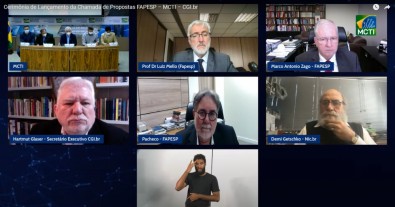
In collaboration with MCTI, Ministry of Communications and CGI.br, up to two new centers will be set up. Proposals will be received by February 1, 2022 (image: reproduction)
On October 14, FAPESP launched the second call for proposals for the creation of Applied Research Centers in Artificial Intelligence (CPAs-IA), in collaboration with the Ministry of Science, Technology and Innovations (MCTI), the Ministry of Communications and the Internet Steering Committee in Brazil (CGI.br).
Proposals will be received by February 1, 2022. The initiative is part of the FAPESP Engineering Research Centers/Applied Research Centers Program, which offers support for the creation of research centers in universities or research institutes in partnership with companies.
In the new call, up to two centers will be selected for the development of scientific, technological and innovation research aimed at solving problems with the use of artificial intelligence. One of the centers will focus on information security and cybersecurity and the other, with a broader agenda, will develop research on machine learning, neural networks and robotics, among other technologies. One of the centers will be headquartered in the State of São Paulo and the other must be headquartered in another state.
The composition of each CPA-IA includes researchers from its host institution and, obligatorily, from at least three more Science and Technology Research Institutions (ICTs) from other units of the Federation. It must also have at least one well-established partnership with an international ICT with relevant expertise in the field of artificial intelligence.
FAPESP will reserve a total of up to R$ 20 million for the implementation of the call. In turn, each CPA-IA can apply to the Foundation for a budget of at most R$ 1 million per year, and the partner company must make equivalent contributions.
The resources for financing the projects come from the collection of resources remaining from the period in which FAPESP managed the activities of domain registration of IP addresses in the country, between 1998 and December 2005, when this task was then taken on by the Information Center and Coordination of Ponto BR (NIC.br).
The public notice, however, does not limit the budget composition of the centers to FAPESP and the partner company – those that indicate the existence of funding from other sources, such as other companies, state Research Support Foundations, will be valued in the process of evaluating proposals. third sector entities.
The call for proposals is published in: www.fapesp.br/15116.
National Technology Agenda
The launch of the second call for proposals took place in event of the MCTI, with the participation of Minister Marcos Pontes, Secretary of Entrepreneurship and Innovation, Paulo Alvim, and Secretary of Broadcasting of the Ministry of Communications, Maximiliano Martinhão. FAPESP's president, Marco Antonio Zago, the director-president of the Technical-Administrative Council, Carlos Américo Pacheco, and the Foundation's scientific director, Luiz Eugênio Mello, took part online, in addition to three CGI.br representatives: Márcio Migon, coordinator; Demi Getschko, advisor; and Hartmut Glaser, Executive Secretary.
“Across the world, countries are making national agendas for artificial intelligence technologies. We are providing the country with resources for this recovery”, said Zago.
Mello remembered that in first call 19 proposals were submitted, evaluated between October 2020 and March 2021.
“There were 80 opinions, including those from international consultants. The expectation was to select four projects, but, given the quality of the proposals, FAPESP, MCTI and CGI.br decided to select six, in São Paulo and in other states, in the areas of health, industry, agriculture and smart cities”, said the scientific director of FAPESP.
Pacheco underlined that artificial intelligence research centers will also be focused on training qualified human resources at various levels. “The shortage of staff is gigantic. I hope that the proponents are challenged to form regional alliances capable of presenting a plan with a national dimension in the training of human resources”, he said.
“I emphasize the importance of the partnership with FAPESP and CGI.br in order to continue strategic programs,” said the Minister of Science, Technology and Innovation.
Source: ABES Portal with FAPESP Agency












